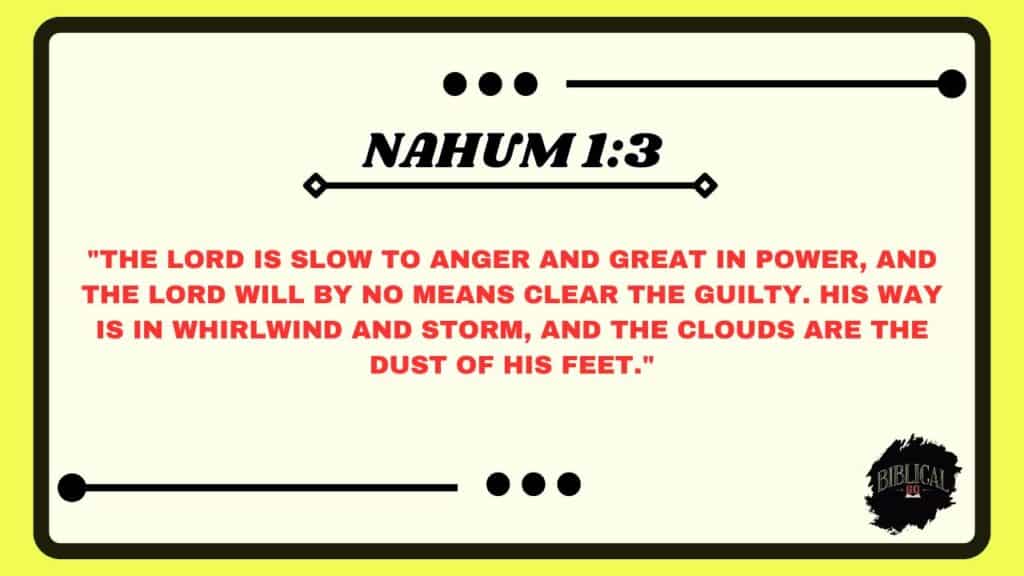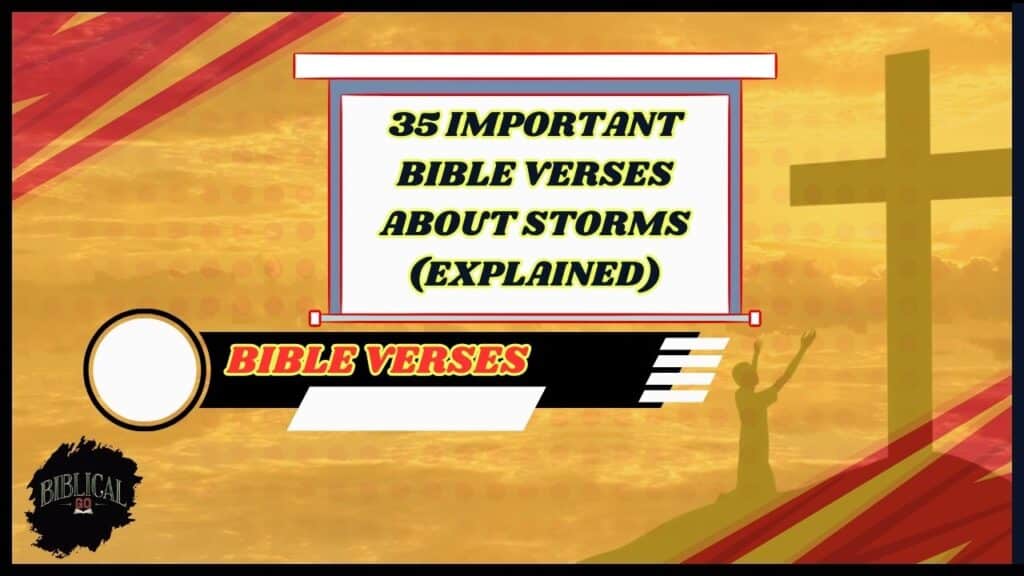Bible Verses About Storms: Life is full of storms. Some are physical – the thunder and lightning kind that make us seek shelter. Others are metaphorical – the turbulent seasons of life that shake our faith and test our resolve. In both cases, Scripture offers us wisdom, comfort, and perspective.
The Bible frequently uses storms as both literal events and powerful metaphors. From Noah’s flood to Jesus calming the raging sea, storms represent challenges, divine power, and opportunities for spiritual growth. These verses remind us that God is present in our darkest moments, able to calm any storm, and sometimes even works through them to shape us.
Whether you’re facing a season of turmoil or simply seeking biblical wisdom about life’s inevitable challenges, these 35 verses about storms provide divine insight and encouragement to weather whatever comes your way.
Also Read: 37 Amazing Bible Verses About Sunsets (Explained)
God’s Power Over Storms
Psalm 107:29
“He made the storm be still, and the waves of the sea were hushed.”
This beautiful verse reminds us that God has ultimate authority over nature’s fury. Just as He can calm physical storms with a word, He can bring peace to the turbulent circumstances in our lives. When facing life’s tempests, remember that the same God who commands the wind and waves is watching over you.
Nahum 1:3
“The LORD is slow to anger and great in power, and the LORD will by no means clear the guilty. His way is in whirlwind and storm, and the clouds are the dust of his feet.”

This verse reveals God’s sovereignty even in the midst of storms. The imagery of storms as the dust beneath God’s feet puts our troubles in perspective – what seems overwhelming to us is tiny to Him. When storms rage around you, remember their scale compared to God’s immeasurable power.
Job 38:1
“Then the LORD answered Job out of the whirlwind and said…”
God chose to speak to Job from within a whirlwind, demonstrating that He is present even in tumultuous circumstances. This teaches us that storms may sometimes be the very means through which God communicates with us. During life’s hardest moments, listen carefully – God may be speaking to you through the storm.
Mark 4:39
“And he awoke and rebuked the wind and said to the sea, ‘Peace! Be still!’ And the wind ceased, and there was a great calm.”
Jesus’ authority over nature demonstrated His divine power to the disciples. This verse assures us that Christ has power over every storm – both literal and figurative – in our lives. When feeling overwhelmed by circumstances, remember you can call on the same Jesus who commanded the wind and waves.
Jeremiah 10:13
“When he utters his voice, there is a tumult of waters in the heavens, and he makes the mist rise from the ends of the earth. He makes lightning for the rain, and he brings forth the wind from his storehouses.”
This verse portrays God as the master of meteorology, controlling every aspect of storms. It reminds us that even the most chaotic natural phenomena are under divine governance. Find comfort in knowing that every element of your storm – however wild it seems – is still within God’s control.
Psalm 135:7
“He it is who makes the clouds rise at the end of the earth, who makes lightnings for the rain and brings forth the wind from his storehouses.”
Similar to Jeremiah’s words, this psalm emphasizes God’s creative authority over weather patterns. The imagery of winds being released from storehouses suggests intentionality in God’s actions. Recognize that storms in your life may serve specific divine purposes you cannot yet understand.
Exodus 9:23
“Then Moses stretched out his staff toward heaven, and the LORD sent thunder and hail, and fire ran down to the earth. And the LORD rained hail upon the land of Egypt.”
This verse shows God using storms as instruments of His will during the plagues of Egypt. While not all storms are divine judgments, this reminds us that God can use difficult circumstances to accomplish His purposes. Consider whether your storm might be redirecting you toward greater alignment with God’s will.
Finding Shelter in the Storm
Psalm 46:1-3
“God is our refuge and strength, a very present help in trouble. Therefore we will not fear though the earth gives way, though the mountains be moved into the heart of the sea, though its waters roar and foam, though the mountains tremble at its swelling.”
This psalm provides a powerful image of God as our unshakable refuge even amid cataclysmic events. The vivid imagery of mountains falling into churning seas represents extreme circumstances that still cannot separate us from God’s protection. When your world seems to be falling apart, run to God as your reliable shelter.
Isaiah 25:4
“For you have been a stronghold to the poor, a stronghold to the needy in his distress, a shelter from the storm and a shade from the heat; for the breath of the ruthless is like a storm against a wall.”
Isaiah beautifully portrays God as a storm shelter for the vulnerable. This verse emphasizes God’s special concern for those who are defenseless against life’s hardships. If you feel powerless against your current storm, take heart that God specifically promises to be your protective stronghold.
Psalm 91:1-2
“He who dwells in the shelter of the Most High will abide in the shadow of the Almighty. I will say to the LORD, ‘My refuge and my fortress, my God, in whom I trust.'”
While not explicitly mentioning storms, this beloved passage promises divine protection for those who make God their dwelling place. The imagery of shelter conveys safety during life’s tempests. Make a habit of spiritually abiding in God’s presence to experience His protective covering during difficult seasons.
Proverbs 10:25
“When the tempest passes, the wicked is no more, but the righteous is established forever.”
Solomon contrasts the temporary nature of both storms and the wicked with the permanence of the righteous. This provides perspective that storms are always temporary, while righteous character endures. Focus on building enduring spiritual character rather than merely escaping your current difficulties.
Psalm 61:2-3
“From the end of the earth I call to you when my heart is faint. Lead me to the rock that is higher than I, for you have been my refuge, a strong tower against the enemy.”
David’s cry illustrates how storms can leave us feeling faint-hearted and vulnerable. The image of God as an elevated rock provides hope that He lifts us above overwhelming circumstances. When storms leave you feeling depleted, ask God to raise you to His perspective above the raging waters.
Isaiah 32:2
“Each will be like a hiding place from the wind, a shelter from the storm, like streams of water in a dry place, like the shade of a great rock in a weary land.”
This prophecy describes the protection found under righteous leadership, ultimately fulfilled in Christ. It compares good leadership to shelter during storms. Seek community with godly believers who can provide practical and spiritual support during your storms.
Ezekiel 13:13
“Therefore thus says the Lord GOD: I will make a stormy wind break out in my wrath, and there shall be a deluge of rain in my anger, and great hailstones in wrath to make a full end.”

Ezekiel warns of divine judgment portrayed as a destructive storm. While sobering, this verse reminds us that God sometimes uses storms to expose and remove what is false in our lives. Allow the storms you face to reveal any areas of your life built on shaky foundations.
Storms as Testing and Refinement
Matthew 7:24-27
“Everyone then who hears these words of mine and does them will be like a wise man who built his house on the rock. And the rain fell, and the floods came, and the winds blew and beat on that house, but it did not fall, because it had been founded on the rock. And everyone who hears these words of mine and does not do them will be like a foolish man who built his house on the sand. And the rain fell, and the floods came, and the winds blew and beat against that house, and it fell, and great was the fall of it.”
Jesus uses the metaphor of a storm to illustrate how life’s challenges test the foundation of our faith. This powerful parable teaches that storms reveal whether we’ve merely heard God’s word or actually built our lives upon it. Use times of trial to honestly assess whether your spiritual foundation is firmly established on Christ and His teachings.
1 Peter 1:6-7
“In this you rejoice, though now for a little while, if necessary, you have been grieved by various trials, so that the tested genuineness of your faith more precious than gold that perishes though it is tested by fire may be found to result in praise and glory and honor at the revelation of Jesus Christ.”
Peter compares trials to the refining process of precious metals. Just as storms wash away debris, spiritual trials purify our faith. During your storm, consider what impurities God might be removing from your life to make your faith more genuine and valuable.
James 1:2-4
“Count it all joy, my brothers, when you meet trials of various kinds, for you know that the testing of your faith produces steadfastness. And let steadfastness have its full effect, that you may be perfect and complete, lacking in nothing.”
James offers a radical perspective on trials, encouraging believers to view them joyfully as opportunities for growth. Like weather systems that strengthen trees by forcing them to develop deeper roots, storms deepen our spiritual steadfastness. Try to identify specific ways your current storm is developing perseverance in your character.
Luke 6:48-49
“He is like a man building a house, who dug deep and laid the foundation on the rock. And when a flood arose, the stream broke against that house and could not shake it, because it had been well built. But the one who hears and does not do them is like a man who built a house on the ground without a foundation. When the stream broke against it, immediately it fell, and the ruin of that house was great.”
Luke’s version of the wise and foolish builders parable emphasizes the importance of digging deep spiritually. This suggests that preparation before storms is crucial for weathering them successfully. Ask yourself what spiritual disciplines you can develop now to prepare for future storms.
Isaiah 54:11
“O afflicted one, storm-tossed and not comforted, behold, I will set your stones in antimony, and lay your foundations with sapphires.”
Isaiah prophesies God’s tender restoration of Israel after periods of suffering. The imagery of rebuilding with precious stones suggests that God creates beauty from the destruction storms leave behind. Look for ways God might be laying new, more beautiful foundations in your life through current difficulties.
Also Read: 37 Important Bible Verses About Sports (Explained)
Faith During the Storm
Matthew 14:29-31
“He said, ‘Come.’ So Peter got out of the boat and walked on the water and came to Jesus. But when he saw the wind, he was afraid, and beginning to sink he cried out, ‘Lord, save me.’ Jesus immediately reached out his hand and took hold of him, saying to him, ‘O you of little faith, why did you doubt?'”
Peter’s experience illustrates how focusing on the storm rather than on Jesus leads to sinking in fear. His cry for help demonstrates that even faltering faith is enough for Jesus to respond with immediate rescue. When feeling overwhelmed by your circumstances, redirect your focus from the waves to the Savior who walks above them.
Mark 4:40
“He said to them, ‘Why are you so afraid? Have you still no faith?'”
Jesus’ question to His disciples reveals that fear and faith exist in inverse relationship. Their terror during the storm exposed the limited nature of their trust in Him. Examine whether your response to difficulties reveals fear or faith, and ask God to strengthen your trust in His care and power.
Psalm 55:8
“I would hurry to find a shelter from the raging wind and tempest.”
David expresses the natural human desire to escape life’s storms. This honest prayer acknowledges the instinct to seek immediate relief from suffering. Allow yourself to express authentic emotions about your storms to God, knowing He understands your desire for shelter and peace.
Isaiah 43:2
“When you pass through the waters, I will be with you; and through the rivers, they shall not overwhelm you; when you walk through fire you shall not be burned, and the flame shall not consume you.”
This promise emphasizes God’s presence with us during, not just after, life’s storms. The phrase “pass through” acknowledges that difficulties must sometimes be endured rather than circumvented. Find comfort not in the absence of storms but in the constant companionship of God as you navigate through them.
Psalm 57:1
“Be merciful to me, O God, be merciful to me, for in you my soul takes refuge; in the shadow of your wings I will take refuge, till the storms of destruction pass by.”

David’s prayer during persecution beautifully illustrates finding spiritual shelter under God’s protective “wings” while storms rage. This teaches us that inner peace is possible even when external circumstances remain chaotic. Cultivate a habit of mental and spiritual refuge-taking through prayer and meditation on Scripture during turbulent times.
Hebrews 6:19
“We have this as a sure and steadfast anchor of the soul, a hope that enters into the inner place behind the curtain.”
Using maritime imagery, the author describes hope in Christ as an anchor during life’s storms. This powerful metaphor reminds us that being anchored in Christ provides stability even amid violent tossing. Strengthen your spiritual anchor by regularly reminding yourself of the specific promises God has made to you.
Also Read: 36 Important Bible Verses About Clarity (Explained)
God’s Purposes in the Storm
Job 37:9-13
“From its chamber comes the whirlwind, and cold from the scattering winds. By the breath of God ice is given, and the broad waters are frozen fast. He loads the thick cloud with moisture; the clouds scatter his lightning. They turn around and around by his guidance, to accomplish all that he commands them on the face of the habitable world. Whether for correction or for his land or for love, he causes it to happen.”
This passage from Elihu’s speech to Job provides a theological framework for understanding storms – they can be instruments of correction, provision, or divine love. This multi-faceted view helps us resist oversimplified interpretations of our difficulties. Consider which of these purposes might apply to your current storm, while remaining humble about fully understanding God’s ways.
Jonah 1:4
“But the LORD hurled a great wind upon the sea, and there was a mighty tempest on the sea, so that the ship threatened to break up.”
The storm in Jonah’s story served as divine intervention to redirect a prophet running from his calling. This demonstrates how God sometimes uses storms to arrest our attention and change our direction. Reflect on whether your storm might be prompting necessary course corrections in your life.
Acts 27:13-44
“Now when the south wind blew gently, supposing that they had obtained their purpose, they weighed anchor and sailed along Crete, close to the shore. But soon a tempestuous wind, called the northeaster, struck down from the land… Since we were violently storm-tossed, they began the next day to jettison the cargo… When neither sun nor stars appeared for many days, and no small tempest lay on us, all hope of our being saved was at last abandoned.”
Paul’s shipwreck narrative illustrates how storms can lead to unexpected ministry opportunities. Through this disaster, Paul demonstrated faith, provided leadership, and ultimately brought the gospel to Malta. Look for unique ways God might be using your storm to position you to influence others who wouldn’t otherwise be reached.
Isaiah 29:6
“You will be visited by the LORD of hosts with thunder and with earthquake and great noise, with whirlwind and tempest, and the flame of a devouring fire.”
Isaiah prophesies divine judgment described in terms of powerful storm imagery. This underscores that some storms may serve as wake-up calls to spiritual realities we’ve been neglecting. Allow the disruptive nature of your storm to reawaken spiritual sensitivities that may have grown dull in times of ease.
Psalm 148:8
“Fire and hail, snow and mist, stormy wind fulfilling his word!”
This praise psalm portrays storms as obedient servants fulfilling God’s commands. This perspective elevates our view of difficulties from random occurrences to purposeful instruments in God’s hands. Praise God for His sovereign designs, recognizing that even your storm answers to His authority and serves His purposes.
Also Read: 36 Important Bible Verses About Anointing (Explained)
After the Storm: God’s Restoration
Genesis 8:1
“But God remembered Noah and all the beasts and all the livestock that were with him in the ark. And God made a wind blow over the earth, and the waters subsided.”
After the greatest storm in history, God sent a wind to dry the earth and begin restoration. This demonstrates God’s faithfulness to bring renewal after devastation. Trust that God remembers you in your storm just as He remembered Noah, and is already preparing the way for restoration.
Genesis 9:13-16
“I have set my bow in the cloud, and it shall be a sign of the covenant between me and the earth. When I bring clouds over the earth and the bow is seen in the clouds, I will remember my covenant between me and you and every living creature of all flesh. And the waters shall never again become a flood to destroy all flesh. When the bow is in the clouds, I will see it and remember the everlasting covenant between God and every living creature of all flesh that is on the earth.”
The rainbow after the flood became a permanent symbol of God’s promise to limit destruction. This teaches us that God often provides visible reminders of His faithfulness following our storms. Look for the “rainbows” God places in your life after difficulties – the blessings and assurances that come after the rain.
Psalm 30:5
“For his anger is but for a moment, and his favor is for a lifetime. Weeping may tarry for the night, but joy comes with the morning.”
David poetically contrasts the temporary nature of hardship with the enduring quality of God’s favor. This beautiful promise reminds us that storms eventually give way to sunrise. Hold onto hope during dark nights by remembering the certainty of morning’s arrival in God’s perfect timing.
Job 42:10
“And the LORD restored the fortunes of Job, when he had prayed for his friends. And the LORD gave Job twice as much as he had before.”

After Job’s profound spiritual storm, God brought restoration exceeding his former state. This pattern of “double blessing” after suffering appears throughout Scripture. Maintain hope that God may use your storm as the prelude to unprecedented blessing, though the form of that blessing may surprise you.
Joel 2:25-26
“I will restore to you the years that the swarming locust has eaten, the hopper, the destroyer, and the cutter, my great army, which I sent among you. You shall eat in plenty and be satisfied, and praise the name of the LORD your God, who has dealt wondrously with you. And my people shall never again be put to shame.”
Joel prophesies God’s ability to restore what was lost during times of devastation. This extraordinary promise suggests that God can redeem even the time consumed by our storms. Trust that God can work redemptive with what appears wasted or destroyed in your life, bringing restoration beyond what seems naturally possible.
Also Read: 39 Powerful Bible Verses About Commitment
Practical Ways to Use These Verses During Life’s Storms
When facing life’s inevitable storms, these scriptural truths can become practical anchors for your soul.
Here are some ways to apply them:
- Create a Storm Survival Kit: Write these verses on index cards and keep them in places you’ll see regularly – your bathroom mirror, car dashboard, or as phone wallpaper.
- Develop a Storm Prayer: Combine phrases from these verses into a personalized prayer you can recite when anxiety rises. For example: “Lord, you who command the wind and waves, be my refuge and strength in this present trouble.”
- Journal Through the Storm: Record your experiences alongside relevant verses, noting how God’s word speaks specifically to your situation.
- Share Storm Stories: When supporting others in crisis, share both the scripture and your testimony of how God has been your shelter in previous storms.
- Create Visual Reminders: Display artwork or symbols that remind you of God’s presence in storms – perhaps a lighthouse image or a simple ship’s anchor as a phone background or desk ornament.
- Memorize Key Verses: Commit shorter verses like Psalm 107:29 to memory, so they’re available when technology isn’t.
- Practice Storm Meditation: Spend time visualizing Jesus calming the storm as you breathe deeply and release your anxieties to Him.
Frequently Asked Questions
Why does God allow storms in our lives?
Storms serve multiple purposes in our spiritual development. They can test and strengthen our faith (James 1:2-4), redirect our paths when we’ve strayed (Jonah 1:4), reveal what we’ve built our lives upon (Matthew 7:24-27), and create opportunities to witness God’s power and provision (Acts 27). While not all suffering comes directly from God, He works redemptively through all circumstances to accomplish His purposes and shape us into Christ’s image (Romans 8:28-29).
How can I maintain faith when my storm seems endless?
Extended periods of difficulty can challenge even the strongest faith. Focus on God’s character rather than your changing circumstances. Remember biblical examples of endurance like Joseph (13 years from pit to palace) and David (years as a fugitive before becoming king). Break down “survival” into smaller increments, practicing present-moment faith rather than worrying about how long the storm might last. Stay connected to supportive community, as isolation intensifies despair.
Are all storms sent by God?
Scripture reveals various sources of life’s storms. Some come directly from God for specific purposes (Jonah 1:4), some result from living in a fallen world (John 16:33), others stem from our own choices (Galatians 6:7-8), and some are attacks from spiritual enemies (Ephesians 6:12). Regardless of origin, God remains sovereign over every storm and can work through each for our ultimate good and His glory (Romans 8:28).
How should I help others going through storms?
The Bible provides beautiful examples of storm support. Be physically present like Job’s friends initially were (Job 2:11-13). Offer practical help as the early church did (Acts 2:44-45). Share relevant scriptures without using them to minimize suffering. Pray with and for them regularly. Listen more than you speak. Remember that sometimes the most spiritual thing you can do is simply sit in the ashes alongside someone, demonstrating that they’re not alone in their storm.
What if my storm is a result of my own sin?
When our choices contribute to our difficulties, God still extends grace. Begin with honest confession (1 John 1:9), accepting full responsibility without minimizing your actions. Seek wisdom to understand necessary consequences while trusting God’s redemptive work. Remember that even storms resulting from our mistakes can be transformed into testimonies of God’s restoration (Psalm 51). The same God who used David’s failure with Bathsheba and Peter’s denial can redeem your storm for His glory.
Conclusion: Bible Verses About Storms
Storms – whether physical tempests or seasons of spiritual turbulence – are inevitable parts of our journey. Yet throughout Scripture, we see God’s consistent pattern: He commands the storm, companions us through the storm, and creates beauty from the storm.
These 35 verses reveal a God who is never surprised by the storms we face. He remains in perfect control, using even the most violent tempests to accomplish His good purposes. Whether causing the storm, calming the storm, or simply accompanying us through it, God’s presence transforms how we experience life’s most challenging seasons.
As you navigate your current or future storms, may these verses anchor your soul to unchanging truth. Remember that the God who spoke light into darkness and order into chaos continues to work powerfully – often most visibly within life’s fiercest storms. The wind and waves still know His name, and so can you.
Read more knowledgeable blogs on Biblical Go

Piper McMillan is a devoted writer and Bible enthusiast, offering insightful guides on Bible verses. Her blog provides practical interpretations and reflections, helping readers deepen their faith and understanding of Scripture through accessible and inspiring content.



